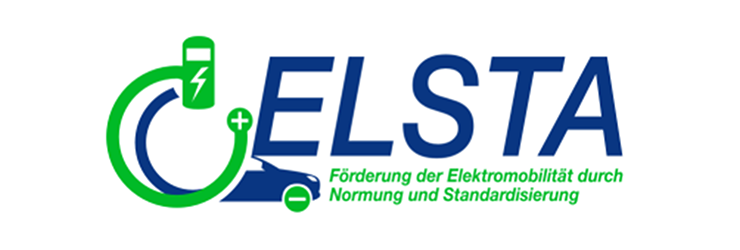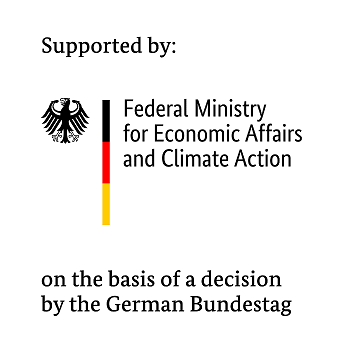ELSTA
Promoting electromobility through standardization

Germany: Lead market for electromobility – Expanding the national pioneering position through standardization
In order to achieve this goal, the Federal Ministry for Economic Affairs and Climate Protection (formerly Economy and Energy) decided to promote coordinating activities and suitable accompanying measures in the area of standardization in a joint project between DIN, DKE (VDE) and NAAutomobil (VDA).
ELSTA project completed
Successful contribution to the promotion of electromobility
After four and a half years of intensive work, the ELSTA project (Promotion of electromobility through standardization) ended in December 2024. Under the leadership of DIN (German Institute for Standardization) and in close cooperation with DKE (German Commission for Electrical, Electronic & Information Technologies) and VDA (German Association of the Automotive Industry), the project has successfully supported national stakeholders and advanced international standardization in the field of electromobility.
The aim of the project was to support electromobility through the targeted further development of standards and specifications at national and international level. This enabled Germany to further consolidate its pioneering role in this key technology and provide forward-looking impetus for global standardization.
Key topics and milestones of the project
As part of the ELSTA project, various key topics were addressed that are of central importance for the sustainable and safe further development of electromobility. The most important topics included:
- Heavy traffic: Electromobility in heavy traffic poses particular challenges, especially in terms of charging infrastructure and range. Standards were developed to enable the integration of electric heavy-duty vehicles. Activities relating to the megawatt charging system and the definition of a high-voltage interface were supported. The development of an Overview of the relevant standards and specifications for the electrification of heavy-duty vehicles (text in German) also makes an important contribution to ensuring the early integration of existing standards and specifications and identifying gaps.
- Grid integration and bidirectional charging: Standards are needed to integrate the increasing number of electric vehicles into the electricity grid. ELSTA has made important contributions to the grid integration of charging infrastructures to ensure grid stability. The ability to feed energy from vehicle batteries back into the power grid is also a decisive factor in the energy transition. ELSTA has supported the development of standards as well as other activities such as the creation of the ETA's BiDi charging standardization roadmap or the creation of the Bidi charging hazard and risk analysis (text in German) in order to advance this technology in terms of standards.
- Battery management systems and traction batteries: These systems are at the heart of electromobility. As part of the project, accompanying measures were carried out for the development of standards that improve the service life, performance and safety of batteries.
- Comparison of charging performance and error codes: In order to be able to compare the charging process for different vehicle types, ELSTA supported the development of standards for the standardized determination of charging performance. The standardization of error codes within the framework of DIN DKE SPEC 99003 Unified Error Codes for a Reliable Electric Vehicle Charging Ecosystem are also the basis for increasing the reliability of charging infrastructure and improving the customer experience.
- Battery passport and sustainability: The traceability and recycling of batteries are key issues for the sustainability of electromobility. The battery passport was promoted as part of DIN DKE SPEC 99100 Requirements for data attributes of the battery passport in order to create transparency regarding the origin and life cycle of batteries. ELSTA also supported the publication on Heavy Commercial Vehicles – Specifications and standards for Alternative Drives as part of the NPM.
- Safety and accessibility: ELSTA also focused on the safety of electric vehicles and charging infrastructures as well as the barrier-free use of these technologies. DIN SPEC 91489 - Requirements for fire limitation blankets for use with electric vehicles and DIN SPEC 91504 - Barrier-free charging infrastructure for electric vehicles lay the initial foundations for future standardization work in this field.
International cooperation and strengthening German interests
A central goal of ELSTA was to effectively represent Germany's interests in international standardization. The close monitoring and support of national experts in international standardization committees ensured that German innovations and technological standards were integrated in the best possible way. In this way, the project has been making a significant contribution to strengthening German industry in global competition and further promoting the acceptance of electromobility.
Future prospects
The standards and specifications developed as part of ELSTA are crucial for the future of electromobility. They form the basis for broader market acceptance, higher safety standards and improved grid integration of electric vehicles. The successful completion of this project will pave the way for further internationalization and harmonization of standards that will not only drive forward electromobility, but also the energy transition as a whole.
With ELSTA, Germany has once again consolidated its position as a pioneer in electromobility and the associated standardization. The results of this project will continue to have an impact for a long time to come and will have a significant influence on global progress in this area.
We would like to thank everyone involved for their commitment and cooperation over the past four and a half years and look forward to seeing the fruits of their labour in the years to come. The future of mobility is electric - and ELSTA has made a significant contribution to this.
For further information please see project website.
Project duration
07/2020 – 06/2024 extended until 12/2024
Project coordination
- DIN German Institute for Standardization
Project partners
- DKE German Commission for Electrical, Electronic & Information Technologies
- VDA German Association of the Automotive Industry
Project funding
The ELSTA project has received funding by the Federal Ministry for Economic Affairs and Climate Action.
